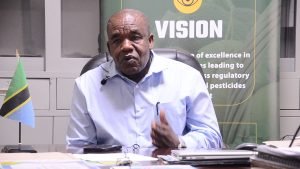UN To Continue Support Tanzania To Strengthen Disaster Risk Reduction Interventions
By Staff Writer, Dodoma
THE United Nations (UN) Agency, the World Food Program (WFP) has said it will continue supporting Tanzania to strengthen the country’s capacity and resources in the preparedness on disaster risk reduction and management.
It also challenged the country to increase financial resources towards disaster risk reduction and management, saying the humanitarian sector was very sensitive.
In his remarks during observation of this year’s International Day For Disaster Risk Reduction, the Deputy Country Director of the UN’s World Food Programme (WFP), Brian Bogast, spoke over the need to improve coordination between the government, the public and private sectors in order to heighten the capacity of the sector.
“Tanzania is making good strides in preparedness, as well as disaster risk reduction issues but more efforts are needed to enable
He communicated that the government is supposed to work efforts to source and allocate more financial resources in order to stand on a professional side to deal with different forms of disasters.
“Public institutions and NGOs must develop a collaborative platform upon which to bridge needed resources and expertise pertaining to preparedness on disaster risk reduction and management, “he observed.
He insisted that interventions on preventing the outbreak of disasters must be given first priority in order to serve people’s lives, especially in the marginalized communities across the country.
Speaking for her part, Deputy Minister in the Prime Minister’s Office, Policy and Parliamentary Coordination, Ummy Nderiananga who graced the event, said the government has so far put in place friendly policies and laws to help prevent and improve service delivery to special groups when it comes to disaster outbreaks.
“President Samia Suluhu Hassan has always insisted that the special groups, ranging from the girls, elders, women and disabled must be treated with a ‘gloved hands’ when implicating in different forms of disasters,” she unveiled.
Under the theme of ‘for fighting inequality for a resilient future’ Minister Nderiananga expressed that this year’s International Day For Disaster Risk Reduction aligns with the Sendai Framework, the international agreement to prevent and reduce losses in lives, livelihoods, economies and basic infrastructure.
“The government will continue to engage numerous potential stakeholders and the relevant experts from the private sector to further strengthen the country’s capability in the preparedness on disaster risk reduction and management,” she assured.
For his side, the Disaster Management and Humanitarian Experts at the Response And Preparedness In Disaster (RAPID)- Tanzania, Ruger Kahwa said there are major gaps in coordination on disaster risk issues across the country.
“There are several institutions with different capacities over disaster risk management in Tanzania but most of them are operating separately. It’s high time now for all stakeholders to join efforts in order to strengthen the performance of the sector.
Professor Albino Tenge, who represented the Vice- Chancellor of the University of Dodoma (UDOM) in the event, expressed that the state-owned varsity is working to support the government to improve the country’s disaster risk reduction, as well as management.
“For instance, we have initiated a special course, the Bachelor of Arts (BA) in Environmental Disaster Management, the vital faculty which moulds key human resources in the sector,” he expressed.
The Director of the World Vision Tanzania (WVT) Rev. Dr. Joseph Mayala Joseph Mayala, expressed the need for the faith and religious leaders to be included in the risk reduction and management issues.
“The religious leaders have a majority of people in their religious houses and thus, they’re the key figures in educating the public on issues pertaining to disaster management, let’s make full use of them,” he urged.
This year’s International Day for Disaster Risk Reduction addresses the connection between disasters and inequality. Disasters and inequality are two sides of the same coin. Each adversity reinforces the other: unequal access to services leaves the most vulnerable exposed to the danger of disasters; while the effects of disasters exacerbate inequalities and push the most at risk further into poverty.
Tanzania has so far made significant progress in creating an enabling environment for investment in reducing disaster risks by preparing the National Disaster Management Strategy (2022-2027) along with national and sectoral guidelines, plans and strategies.
However, the Prime Minister’s Office in collaboration with the World Food Program (WFP) of the United Nations has coordinated the assessment of the capacity of disaster management through a partnership known as the Capacity for Disaster Reduction Initiative (CADRI) which includes 20 United Nations (UN)’s organizations and the other international organizations that deals with humanitarian services.











